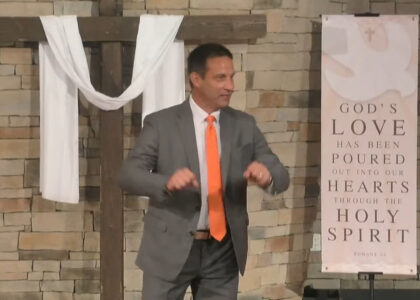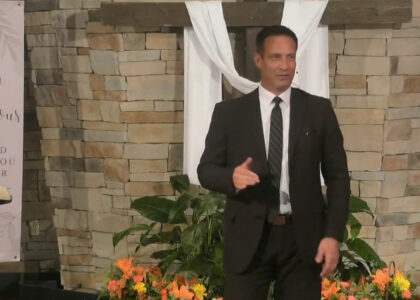The Assurance of Our Adoption Part 1
Watch on YouTube HERE
Text: Romans 8: 12-15 (NIV) 12 Therefore, brothers and sisters, we have an obligation—but it is not to the flesh, to live according to it. 13 For if you live according to the flesh, you will die; but if by the Spirit you put to death the misdeeds of the body, you will live.14 For those who are led by the Spirit of God are the children of God. 15 The Spirit you received does not make you slaves, so that you live in fear again; rather, the Spirit you received brought about your adoption to sonship. And by him we cry, “Abba, Father.”
Introduction.
-
Growing up, I do not recall sermons on the assurance of our salvation in Christ.
- It was understood that the status of being saved was possible, but it was tenuous—you could never be confident.
- Romans 8 gives us strong grounds for a confident assurance, not rooted in ourselves but in a graceful relationship with God the Father, Son, and HS.
-
In 8:9-11, the Spirit is described as both the Spirit of God (the Father) and of Jesus the Son.
- Our new life is one immersed in the life of the Triune God.
- The key idea is as we began a relationship with Jesus, things changed as something new came into our lives: the Spirit was given to us to make this new life with Christ real in us.
- The process of becoming Christ-like continues until we are raised with Christ in the new creation. (Rom. 8:18-32; Col. 3:1-4)
Exploring the Text: An Intimate Relationship with God
Relationships Imply Obligations (8:12-13): Therefore, brothers and sisters, we have an obligation—but it is not to the flesh, to live according to it. 13 For if you live according to the flesh, you will die; but if by the Spirit you put to death the misdeeds of the body, you will live.
- We have a new identity in Christ through the Spirit: We are children becoming more like our Father & Jesus our brother.
- As a Member of God’s Family, We Have a Responsibility: We live by the Spirit in obedience to Jesus.
- We no longer live on the basis of the flesh and its desires as they were formed by the world apart from God.
- Many who go to church seem to have little sense of a new life in Christ: They live like other “good people” in the world, but claim to have the correct religious beliefs required for entrance into heaven.
- In others, the Spirit has begun to wake them up, but they live a life of constant anxiety described in Rom. 7. They do not experience the witness of the Spirit that assures them that they are loved by the Father and safe home with Him because of what the Son has done.
- The Mind of the Spirit is Being Formed in Us. (Rom. 8:1-11)
- As our new life in Christ develops, the Spirit deals with the reality of sin in our lives.
- He begins with our minds & teaches us to accept &obey (put into practice) what Jesus commanded. (see Mt. 7:13-22; 28:20)
- Slowly, we discover the possibility and the beauty of an abundant life in Christ and with the Father through the Spirit.
- The mortification of sin: Putting to death the sinful ways of our lives.
- Go back to Col. 3 and see how vss. 5-17 flow out of vss. 1-4.
An Astonishing Vision of Our Identity (Rom. 8:14-15)
For those who are led by the Spirit of God are the children of God. 15 The Spirit you received does not make you slaves so that you live in fear again; rather, the Spirit you received brought about your adoption to sonship. And by him, we cry, “Abba, Father.”
- The Spirit of sonship rather than a spirit of fear.
- Our obedience to God is not based on constant fear of rejection.
- There is a healthy fear of God & a destructive fear of God.
- Abused children form a destructive fear of abusive parents.
- Living as a child who gladly serves the Father’s will.
- Jesus lived doing the will of His Father.
- Adoption of a Son in the Roman World
- Keller: Adoption was a much more customary legal procedure in Roman society than it was in Hebrew or Near Eastern culture. Paul, as a Roman citizen, would have been familiar with it. Adoption usually occurred when a wealthy adult had no heir for his estate. He would then adopt someone as heir—it could be a child, a youth, or an adult. The moment adoption occurred, several things were immediately true of the new son.
- First, his old debts and legal obligations were paid;
- Second, he got a new name and was instantly heir of all the father had;
- Third, his new father became instantly liable for all his actions (his debts, crimes, etc);
- Fourth, the new son also had new obligations to honor & please his father.
- All this lies behind the passage here. Throughout this passage, Christians are three times called “sons” (huioi) of God (v 14, 15, 19) and three times called “children” (teknon) of God (v 16, 17, 21). In our day, only gender-neutral language (“children”) is considered appropriate, and referring to men and women with a masculine pronoun (“sons”) is considered insensitive. Some people studying this passage may express this as a concern. But we should not try to correct Scripture. It is true that in Rome “sonship” was a status of privilege and power given only to males. Yet Paul now has the temerity to apply this to us—to all believers! This shows that God does not distinguish in giving honor. All Christians, male and female, are now his heirs. It was a subversive thing for Paul to take a masculine-only institution and show that, in Christ, the institution of “empowering-through-adoption” is used on females as well as males without distinction. Christian women should not resent being called “sons” any more than Christian men should resent being called part of the bride of Christ (Revelation 21:2). Christians are all sons and all the bride—God is even-handed in his use of metaphors! And each metaphor tells us something about our relationship with Christ.[1]
Led by the Spirit: We walk in step with the Spirit (Gal 5:16-26)
- Led not Driven. (Voices, dreams, & special experiences are not the point)
- The Strong Persuasion of the Spirit.
- Increasingly, our will yields to the Spirit.
- Rather than quenching the Spirit, we delight in the opportunity of becoming a mature child of God.
- The Spirit Enlivens God’s Word as it Reveals God’s Character and His Will (see 1 Cor. 2).
- God’s Word Addresses Us Personally: We hear and desire to act.
- God’s Word Begins to Shape Us: We hold to it and practice it.
- God’s Word in Us Begins to Change our Character and Will: The transition from immature babies to mature adults.
- The Spirit of the Father in the Child.
- Example of BK:
- As a little girl she desired to please.
- As a teen there were periods of resistance against my word.
- Over time her character formed; she intuitively understood a lot about my mind and heart without my speaking: the ability to anticipate & work closely with me in love.
- She is no longer my little girl, but my adult daughter whom I cherish and whose love brings me delight and joy.
- An unexpected intimacy with our Father!
- We do not live as forgiven slaves, but as adopted children.
- Our Relational Language changes: “Abba”—Dadders
- Example of BK:
Conclusion: Abiding in Christ, the beloved of the Son of the Father (Jn. 15)
- Some never come to know this kind of intimacy with Jesus.
[1] Keller, T. (2015). Romans 8–16 for You (C. Laferton, Ed.; pp. 25–26). The Good Book Company.





